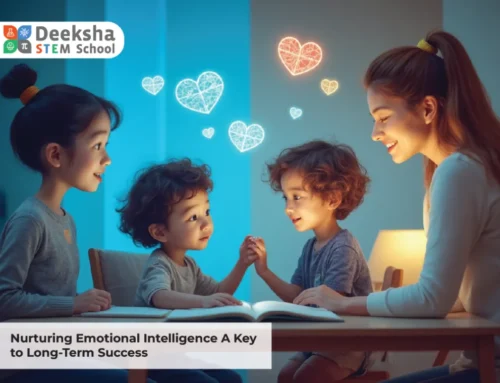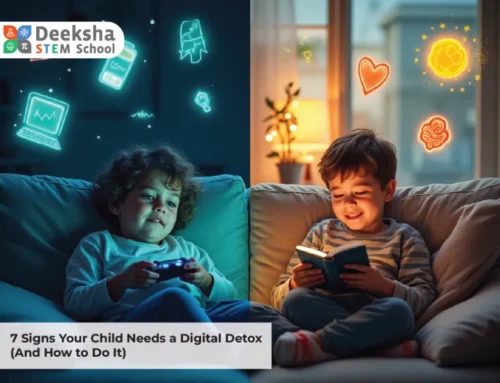Critical thinking is more than just answering tough questions—it’s about learning how to analyze, synthesize, evaluate, and apply information. In an age where information is readily available, developing the ability to think independently and solve problems logically is more essential than ever. One of the most accessible, engaging, and brain-stimulating methods to cultivate this skill? Puzzle games and riddles.
At Deeksha STEM Schools, we recognize that nurturing young minds requires more than textbooks. That’s why we make logic puzzles, brain teasers, and riddles a consistent part of classroom learning and extracurricular activities. These aren’t just games—they are powerful educational tools that enhance thinking skills and promote cognitive flexibility.
Why Critical Thinking Matters in Education
In the modern education landscape, students need more than content knowledge. Critical thinking forms the core of 21st-century skills and helps students:
- Break down complex ideas into manageable components
- Recognize patterns, inconsistencies, and logical relationships
- Make reasoned decisions based on evidence rather than assumptions
- Approach challenges with open-mindedness and analytical rigor
- Transition from passive learning to active problem-solving
By integrating critical thinking into daily learning, students not only perform better academically but also become adaptable thinkers who are prepared for real-world challenges.
The Science Behind Puzzles and Brain Development
Puzzle-solving stimulates both hemispheres of the brain. The left hemisphere supports logical reasoning and analytical thought, while the right promotes creativity and visualization. Together, they create a robust neural environment that enhances:
- Logical Reasoning: Encouraging structured thinking and systematic problem resolution
- Spatial Awareness: Helping students visualize and manipulate patterns and configurations
- Working Memory: Improving the brain’s ability to hold and manipulate information in real-time
- Cognitive Perseverance: Teaching patience, grit, and the willingness to try multiple strategies
- Executive Functioning: Enhancing planning, focus, time management, and flexibility
Engaging regularly with puzzles improves mental agility, promotes curiosity, and strengthens neural pathways associated with critical thinking.
Types of Puzzle Games That Enhance Thinking
| Puzzle Type | Skills Developed |
| Crossword Puzzles | Enhances word recall, spelling, cultural literacy, and cognitive association |
| Sudoku | Boosts number fluency, logic, sequencing, and attention to detail |
| Jigsaw Puzzles | Builds visual reasoning, shape recognition, coordination, and concentration |
| Logic Riddles | Develops abstract thinking, reasoning, and synthesis skills |
| Tangrams and Shape Puzzles | Promotes geometry skills, creativity, and problem-solving in spatial contexts |
| Rubik’s Cube | Improves hand-eye coordination, memory, pattern recall, and strategic thinking |
| Pattern Blocks & Grids | Strengthens symmetrical reasoning, planning, and early mathematical reasoning |
How Riddles Encourage Deeper Thinking
Riddles present problems that often have surprising or counterintuitive solutions. They challenge students to think outside conventional boundaries and stretch their mental muscles. Solving riddles:
- Encourages divergent thinking and multiple-perspective analysis
- Reinforces comprehension and logical deduction
- Stimulates humor, which aids memory retention and engagement
- Helps break down complex language into digestible interpretations
- Builds confidence through achievement in non-traditional problem-solving
In classrooms, riddles often spark spirited discussions, encouraging collaborative learning and respectful debate—two key ingredients of intellectual growth.
Puzzle-Based Learning at Deeksha STEM
Our educators at Deeksha STEM have curated puzzle-integrated strategies that make learning interactive, enjoyable, and intellectually stimulating:
- Morning Brain Boosters: Daily riddles, quick puzzles, or ‘Question of the Day’ to activate thinking from the start
- Concept-Based Puzzles: Incorporating thematic puzzles in science, math, and language classes to reinforce learning
- Logic and Reasoning Labs: Dedicated sessions focused on reasoning games, logic circuits, and visual puzzles
- After-School Brain Clubs: Chess, Sudoku, Rubik’s Cube, and coding games to foster analytical strength
- Gamified Assessments: Using puzzle formats for quizzes and assessments to reduce stress and boost participation
- Puzzle Boards and Competitions: Intra-school contests and open puzzles boards that encourage friendly competition and peer learning
Tips for Parents to Develop Puzzle-Based Thinking at Home
- Create a Puzzle-Friendly Environment: Keep puzzles, word games, and brain teasers accessible at home
- Mix Formats: Use a blend of digital apps, printed puzzles, and physical board games
- Set Puzzle Challenges: Time-based challenges or weekly puzzle goals can boost motivation
- Make It Social: Solve puzzles together to model problem-solving behavior and make it fun
- Discuss Strategies: Talk about how a puzzle was solved, what was difficult, and what patterns were observed
- Encourage Originality: Let your child invent their own riddles or puzzles to boost creativity and application
Frequently Asked Questions
1. At what age should children start solving puzzles?
- Children as young as 2–3 years can start with basic shape-sorting and peg puzzles. As they grow, puzzles can increase in complexity, matching their cognitive stage and interests.
2. Are digital puzzles as effective as physical ones?
- Yes, both have benefits. Digital puzzles provide dynamic feedback and are often adaptive, while physical puzzles promote tactile learning, hand coordination, and deeper focus without screen exposure.
3. Can puzzles help children with low attention spans?
- Absolutely. Engaging, short-duration puzzles are excellent for improving attention spans. Gradually increasing complexity helps children build patience and persistence over time.
4. How often should children engage in puzzle-solving?
- A daily dose of 20–40 minutes of puzzle-solving, either in one go or spread across the day, can lead to measurable improvement in focus, reasoning, and resilience.
5. What makes Deeksha STEM’s approach to puzzles unique?
- At Deeksha STEM, puzzles are not merely extracurricular fun—they are integrated into subject teaching, collaborative work, and even evaluations. We use them strategically to build academic comprehension alongside mental sharpness.
Final Thoughts
Puzzle games and riddles are much more than recreational pastimes—they are tools that unlock the true power of the human mind. They inspire curiosity, nurture independent thought, and cultivate perseverance. More importantly, they make the learning journey enjoyable and rewarding.
At Deeksha STEM Schools, our goal is to transform learning into an exciting intellectual adventure. With puzzle-based learning embedded in our curriculum, students don’t just absorb knowledge—they discover how to think.
Explore how our campuses at Bannerghatta Road, Judicial Layout, Kengeri, and Vidyanagar are building a generation of creative problem-solvers—one puzzle at a time.






Leave A Comment